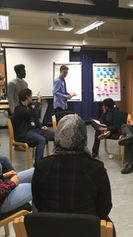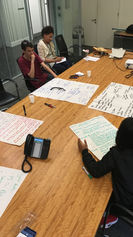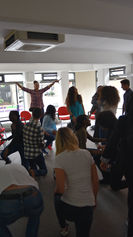
Peer Research
Funded by Trust for London, we support and train organisations and young people to conduct their own research and influence the decisions that impact them.

Young people should be meaningfully involved in decisions that impact their lives, as they are best placed to tell us what they want to see. We believe in empowering communities to conduct research, supporting organisations to develop their participation, and enabling policymakers to access and understand key findings and recommendations to create change.















Our Peer Research work
We have supported over 20 organisations with conducting peer research, training over 400 young Londoners.
We have worked with a range of partners, such as Museum of London, The Greater London Authority, The National House Project, The London Borough of Merton, and Metropolitan Thames Valley. We have also supported youth sector organisations from across the capital, training young people in youth clubs, schools, and at City Hall.


Empowering Voices, Inspiring Change: Event Summary Report


Calling for Change: Young Londoners’ views on a sustainable future for their city.


Levelling up London: Improving London to meet the aspirations, needs, and rights of young people


The Impact of COVID-19 on young people in Merton


Unapologetically Me –‘Transcending Resilience’


Mapping Young London: A View into Young Londoners After A Year in Lockdown
Funded by the Mayor of London, we trained nine groups of young Londoners over 12 months to design and conduct their own peer research projects into the barriers to accessing youth services.
The Young Londoners Programme was a collaboration between Partnership for Young London, Young Harrow, and Rocket Science. The aim was to create peer research projects across the capital that looked at:
-
Access to youth services
-
Barriers to attending youth services
-
Young people’s specific needs and the type of activities young people want
They presented their key findings and recommendations at the "Voices of the Future" event on June 2nd, 2023, to policy makers, funders and decision-makers.
There were 9 groups of young researchers with supporting organisations who have been funded:
See their findings here:




We collaborated with the Greater London Authority on a toolkit for youth sector organisations looking to involve young people in research design and delivery.
Involving Young Londoners: A peer research toolkit was released in September 2021, with our learnings from three years of conducting peer research with young people across the capital.
The toolkit looks at:
-
Introduction to peer research - What is peer research, and why should organisations involve young people in research?
-
Recruitment & remunerations - How do we recruit young people for a peer research project, and how do we remunerate them for their time?
-
Decision making & training - How do we involve young people in decision making, setting the aims of the research, and what training do they need?
-
Deciding on methodology - How can young people make a decision about the methods they want to use to conduct the research?
-
Fieldwork & delivery - How can we conduct a peer research project, and support young people in the field?
-
Co-producing analysis - How can we co-produce analysis and key findings with young people?
-
Communicating findings - How do we communicate the findings from a peer research project?
See the toolkit here:
We will be revising the toolkit this year, so if you have conducted a peer research project and want to share your learning, please get in touch.


We are funded by Trust for London to provide free support and training for organisations and young people.
We have worked with a range of partners, such as Museum of London, The Greater London Authority, The National House Project, The London Borough of Merton, and Metropolitan Thames Valley. We have also supported youth sector organisations from across the capital, training young people in youth clubs, schools, and at City Hall.
We have trained over 300 young people, with projects lasting from one month to 18 months. If you're thinking about how to get the young people you work with involved in co-production, co-design, peer evaluation, or peer research, please get in touch as we can share good practice we've seen across the sector to help you. We also provide free training:
-
We can train young people to design and deliver peer research, with training followed by decision making (below).
-
Training can be either one off, or multiple training sessions as we take young people through an entire project.
-
We can come to your space, or host it at our offices in the City of London.
For more information, or to apply for training, please get in touch.
Title | Text | Text |
|---|---|---|
1. What is peer research? | Understanding of what research is and why it is important to creating change.
Explore the concept of lived experience, and peer research. | How often, where, and when do they want to meet? How do they want to communicate?
What skills, and training, do they want to receive? |
2. Research aims and questions | Understanding of what a research question is and how to generate one.
Explore the issue or topic at hand, with data and examples. | What do you want this project to be?
What is the question we’re trying to answer as part of this project? |
3. Research methods | Understanding the difference between qualitative and quantitative research.
Learn about the different approaches to research and data collection, and their strength and weaknesses. | How do you want to collect data in this project? Focus groups? Surveys? Creative approaches?
Who do we want to speak to and where? |
4. Methods training | Understand how to effectively design chosen research methods (like surveys).
Practice how to conduct effective fieldwork and collect data (interviews). | What questions do we want to ask on the survey or in the interviews?
How do we ensure we speak to who we need to speak to? |
5. Fieldwork training | A check in session at different stages of the fieldwork, to reflect on how practice can be improved. | How have the questions and research methods worked so far and what needs to be improved? |
6. Analysis training | Understanding of how we analyse data in research, both qualitative and quantitatively.
Practice research methods, like creating transcripts and thematically coding. | What are the key findings of the research? What are the key themes of the project?
What are the recommendations, i.e. what do we want to see changed based on the evidence? |
7. Campaign and public speaking | Understanding of how campaigning works and how social change can be achieved through research and policy.
Practice public speaking. | What does a campaign based on the research look like?
Who do you want to speak to and what do you want to say to them? |


